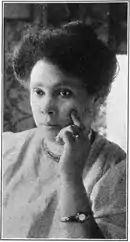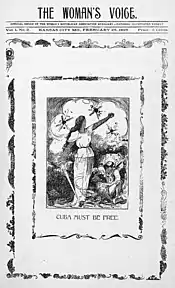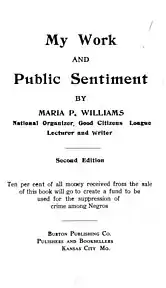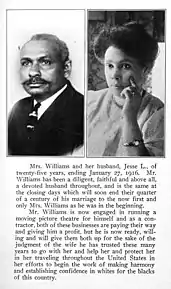Maria P. Williams
Maria Priscilla Thurston Williams (1866–1932) is credited as the first African-American woman film producer for the silent crime drama The Flames of Wrath in 1923.[1] A one-time school teacher, Williams had a history of activism, independence and interest in the liberal arts, which led her first to newspapers, then to film production, script-writing and acting and, finally, to memoir with her 1916 book My Work and Public Sentiment, in which she identified herself as a national organizer and speaker with the Good Citizens League, and stated that ten percent of the proceeds would go to suppressing crime among African Americans.[2][3]
Maria P. Williams | |
|---|---|
 Photo of Maria P. Williams, ca. 1916. | |
| Born | 1866 Versaille, Missouri |
| Died | 1932 Kansas City, Missouri |
| Nationality | American |
| Occupation(s) | Teacher, Actor, Activist, Director, Filmmaker, Editor, Author, Scriptwriter and Producer |
| Known for | First film producer who was also Black and female |
| Notable work | 1923's Flames of Wrath |
| Spouse | Jessie L. Williams |
History
Williams served as editor-in-chief (1891–1894) of the Kansas City weekly New Era.[3] This spurred her to seek greater independence by founding, writing and editing her own newspaper, the Women's Voice (1896–1900), "sponsored by the 'colored women's auxiliary' of the Republican party; the paper was described as having "many pleasant things to say on a choice of timely topics.'"[4] In 1916, Williams went on to publish her memoir.[2]
In 1916, Williams also married entrepreneur Jesse L. Williams, who owned a movie theater among several other businesses in Kansas City.[5] The pair co-managed the movie theater, which gave the couple experience in the distribution and release of films for African-American audiences.[5] With Williams serving both as the company's secretary and treasurer, the couple went on to co-found Western Film Producing Co. and Booking Exchange,[5] and Williams went on to write the script for Flames of Wrath, produce a film from the script and play the role of prosecuting attorney in the five-reel film.[1][4] That same year, Williams' husband died, and she soon went on to marry another man.[4] She died in 1932, after being "called away from her home by a stranger who requested help for his ill brother.[4] She was found shot to death on the side of a road several miles from her home. The murder remains unsolved."[4]
Ironically, the plot for ''Flames of Wrath'' concerns the investigation of a murder after a robbery.[6] Aimee Dixon Anthony stated that Williams could also reasonably be considered the film's director, given how undifferentiated the two roles were at that time.[7] That distinction is typically granted to Tressie Souders, however, who served as director of 1922's A Woman's Error.[7]
See also
Black women film pioneers
- A website for Sisters in Cinema Documentary: A History of African American Women Feature Film Directors
- Black Film Archive: A showcase for Black films made from 1915 to 1979
- Columbia University on Women Film Pioneer Project: African-American Women in the Silent Film Industry
- The Atlantic on When Hollywood's Power Players Were Women
- Greenlight Women on Celebrating Black Female Directors and Actresses over 40
References
- Afi, American Film; Gevinson, Alan; Institute, American Film (1997). Within Our Gates: Ethnicity in American Feature Films, 1911-1960. University of California Press. ISBN 9780520209640.
- "My work and public sentiment; By Maria P. Williams; National Organizer; Good Citizens League lecturer and writer. [Title page]". NYPL Digital Collections. Retrieved 2019-02-23.
- "African-American Women in the Silent Film Industry – Women Film Pioneers Project". Retrieved 2021-09-21.
- "Maria P. Williams". IMDb. Retrieved 2021-09-21.
- "'Flames of Wrath' and the Pioneering African-American Women of Silent Cinema". Film School Rejects. 2021-02-28. Retrieved 2021-09-21.
- Flames of Wrath (1923) - IMDb, retrieved 2021-09-21
- Brownlow, Kevin; Stamp, Shelley; Dixon, Bryony; Day, Karen; Giese, Maria; Field, Tania; Stephens, Francesca; Cheshire, Ellen; Oughton, K. Charlie (2017-01-10). Silent Women: Pioneers of Cinema. Aurora Metro Books. ISBN 9780993220708.


